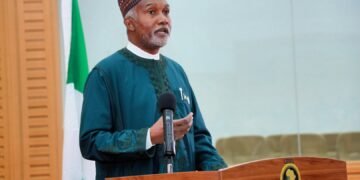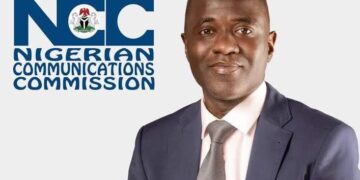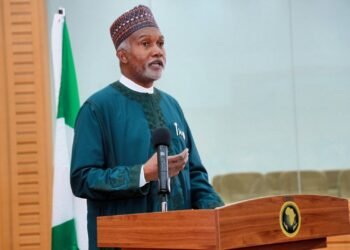President Tinubu Appoints New Board Members for NCC and USPF
In a significant move to enhance Nigeria’s telecommunications sector, President Bola Ahmed Tinubu has approved the appointment of new board members for the Nigerian Communications Commission (NCC) and the Universal Service Provision Fund (USPF). The appointments are seen as pivotal steps towards improving communication services and digital accessibility across the nation. Idris Olorunnimbe has been named Chairman of the NCC, taking the responsibility that oversees Nigeria’s telecom policies and regulations at the board level.
Dr. Aminu Maida continues in his role as Executive Vice Chairman and Chief Executive Officer of the NCC, a position he secured in October 2023 after Senate confirmation. Olorunnimbe brings valuable experience to his new role, having previously chaired the Stakeholder and Governance Committee of the Lagos State Employment Trust Fund, where he focused on youth employment and entrepreneurship initiatives. The newly appointed NCC board members include Abraham Oshidami as Executive Commissioner for Technical Services, Rimini Makama for Stakeholder Management, Hajiya Maryam Bayi, Col Abdulwahab Lawal (RTD), Senator Lekan Mustafa, Chris Okorie, Princess Oforintsenere Emiko, and the board secretary.
Meanwhile, the Universal Service Provision Fund also welcomes new members, including Dr. Folake Omojola, Engr. Ahmed Ismail, and Dr. Adedayo Adekoya. These appointments reflect the government’s commitment to advancing telecommunications infrastructure and ensuring that all Nigerians have access to essential communication services. The Ministry of Communications, Innovation and Digital Economy is expected to leverage the expertise of the new board members to drive policies that foster innovation, connectivity, and growth within Nigeria’s digital landscape.
NCC Enforces Five-Year Ban on Former Officials Joining Telecom Firms to Strengthen Governance
The Nigerian Communications Commission (NCC) has taken significant steps to improve corporate governance within the telecommunications sector. The new guidelines, which came into effect on August 11, 2025, specifically prevent former officials from joining telecom companies for five years after they leave their positions. This initiative aims to bolster transparency, accountability, and ethical practices in Nigeria’s evolving telecom industry.
In addition to restricting former officials, the guidelines, part of the 2025 Corporate Governance Framework, also impose regulations on the internal operations and board structures of telecom operators. The goal is to enhance long-term sustainability and instill investor confidence in the sector.
Key figures affected by this rule include the NCC’s Chairman, Executive Vice-Chairman, and Board Commissioners, who are now barred from taking on roles within any licensed telecom companies. These changes mark a pivotal moment for the telecommunications industry, ensuring that governance remains strong and ethical standards are upheld.
Diesel Suppliers Resume Deliveries to IHS After ONSA and NCC Mediation, Ending Supply Strike
After the intervention from the Office of the National Security Adviser (ONSA), led by Mallam Nuhu Ribadu, along with the Nigerian Communications Commission (NCC), diesel suppliers have resumed their deliveries to IHS, a telecom infrastructure provider responsible for managing over 16,000 base stations for major operators like MTN, Airtel, Globacom, and 9mobile. This development brings much-needed relief to telecommunications firms and their customers.
The suppliers, operating under the Natural Oil and Gas Suppliers Association of Nigeria (NOGASA), announced the suspension of their strike, which had halted the supply of diesel. NOGASA’s National President, Bennett Korie, stated during a press conference in Abuja that the decision to end the industrial action was made possible due to the intervention from both ONSA and NCC officials.
Previously, the suppliers had ceased deliveries to the telecommunications sector, causing significant disruptions. The resolution of the strike is expected to restore stability in telecommunications services, ensuring that base stations remain operational and can adequately serve customers.
NCC Unveils 2025 Corporate Governance Guidelines to Foster Sustainability and Investor Confidence
During the official launch of the 2025 corporate governance guidelines in Lagos on Wednesday, Aminu Maida, the Executive Vice-Chairman (EVC) of the NCC, emphasized that the new regulations aim to enhance long-term business viability, improve service quality, and boost investor confidence. He stated, “Corporate governance has transitioned from being just a soft requirement to becoming a strategic necessity, particularly in a sector crucial to Nigeria’s digital future and susceptible to threats such as cybersecurity, energy instabilities, climate challenges, and increasing consumer expectations.”
Maida highlighted the importance of these guidelines in creating a robust framework for the telecommunications industry, which plays a vital role in Nigeria’s ongoing digital transformation. The NCC’s focus on corporate governance is anticipated to address the vulnerabilities faced by the sector and ensure that operators maintain high standards in their operations.
The newly introduced measures are expected to cultivate a more transparent and accountable telecommunications environment, ultimately benefiting consumers and investors alike. By prioritizing governance, the NCC aims to secure the industry’s growth and sustainability in an increasingly competitive landscape.

































